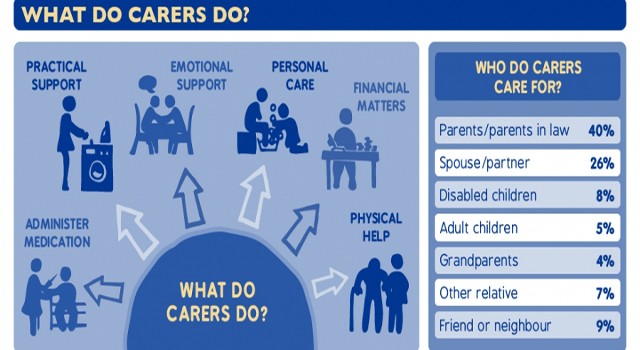National Carers Week was marked a few weeks ago, and we are taking a look at the support that carers provide to those who need them, as well as ways in which carers can ensure they themselves are well cared for.
The role of a carer is incredibly important, whether caring for relatives, friends, children or loved ones. It is often a role that is taken on without payment and yet can be extremely time consuming and emotionally and physically demanding. There are 6.5 million unpaid carers in the UK and these people save the UK economy some £119 billion every year so they really are a crucial part of our society.
Carers provide a range of different types of support, from emotional support, to practical care, administering medication, dealing with financial matters and providing physical assistance. Often the impact of becoming a carer can be hard to take – for example, 60% of carers have experienced a reduction in their income as a result of signing up as a carer.
With this in mind, it is important for those who are doing this essential work to make sure that they also care for themselves – if you are a carer (or you know someone who is) here are a few tips on how to make sure carers are cared for too:
1. Maintain a healthy diet and take plenty of exercise. When you’re putting someone else’s needs in front of your own the simple things like eating well and exercising can get forgotten. A balanced diet should include at least five portions of fruit and vegetables a day (fresh or frozen) and around 30% of what you eat should be made up of starchy foods, preferably those that are high in fibre such as wholemeal bread. Exercise will keep your heart strong, help reduce stress levels and keep you fit – aim for five 30 minute bursts of activities such as walking, swimming or even housework per week.
2. Sleep. Trouble sleeping can have a really negative effect on anyone, particularly someone who has taken on the responsibility of caring. Regular exercise, as described above, can be very helpful with sleep problems and learning how to relax is crucial too – try lying down, closing your eyes and tensing and relaxing each part of your body, from your toes to your head until you start to feel peaceful and heavy.
3. Take time for yourself. There is nothing wrong with taking a break from caring – in fact it is essential. Try to organise someone to take over even just once a week so that you can have a few hours to yourself to do what you need to do – ask friends or family or see if you qualify for respite care.
Carers need caring too. It’s important we acknowledge and appreciate the amazing work the UK’s carers do every day. If you are a carer and you need support, more information is available on these pages:
http://www.nhs.uk/CarersDirect/yourself/Pages/Yourownwellbeinghome.aspx
http://www.carersweek.org/
 Heart of England NHS Foundation Trust officially opened its innovative new laboratory medicine development this week.
Heart of England NHS Foundation Trust officially opened its innovative new laboratory medicine development this week.
The new facility boasts investment in service redesign and new high state-of-the-art equipment, including a 26 metre long automated track to increase efficiency.
More than 9,000 samples will be tested 24 hours a day each day every year from patients attending the Hospital Trust and GPs in the surrounding community, with complete turnaround within 24 hours for the majority of samples. The new facility also provides specialist testing across the region for diseases such as Tuberculosis, cervical cancer, HPV, chlamydia and MRSA.
Lord Carter of Coles and Trust Chairman, Lord Philip Hunt unveiled a plaque to mark the occassion. Lord Patrick Carter of Coles, said: “I am delighted to be here for the opening of this new pathology laboratory at HEFT. Really all the components of a good pathology service are in place.
“This facility provides the best equipment and people to deliver services in an efficient manner – it shows what can be done.”
Steve Waller, general manager of pathology, said: “I am really pleased with the development. It’s more than just a new building, new equipment and new way of working; it will help improve services to patients. It has been designed by those who manage the laboratory to improve the turnaround of samples through automated testing as well as applying the latest technology through facilities such as the specialist testing suite for molecular sciences.”
Jointly funded in partnership with Public Health England West Midlands, the world class development includes a two storey extension to the current pathology building on the Heartlands Hospital site and accommodates a new centralised core laboratory facility testing a multitude of specimens from blood to biopsies.
 Solihull Hospital’s phlebotomy service, currently located on the first floor of Boots in Mell Square, is set to move to a new, larger location to better accommodate high levels of demand.
Solihull Hospital’s phlebotomy service, currently located on the first floor of Boots in Mell Square, is set to move to a new, larger location to better accommodate high levels of demand.
The blood testing service has proved popular with patients, with the team seeing more than 1,000 patients each week; and as a result the site has now been deemed inappropriate for an ever expanding service. The waiting room area has struggled to accommodate the larger volumes of people arriving at one time, and the first floor location is lacking a lift for those unable to take the stairs.
The service, which will remain completely unchanged, will move to premises within the Solihull Hospital site on Lode Lane, where a more spacious area has been identified. This will provide a more comfortable and relaxing environment for patients to wait to have their bloods taken and give the phlebotomy team more room to expand the services.
Erica Loftus, head of operations, said: “Following feedback from our staff around the space issues for the phlebotomy service in Boots, we decided to undertake an in-depth review to ascertain what would be the best move for our patients and the service. We are confident that moving the phlebotomy service across to the larger location will really benefit service users. The move will boost waiting times for patients whilst the speed and flexibility of the service for those stopping by for a blood test will remain the same.”
The Boots outpatients’ service, in partnership with Heart of England NHS Foundation Trust which runs Solihull Hospital, was opened in January 2010. The Trust also offers small physiotherapy, acupuncture, pain, ophthalmology and dermatology services from the Boots, Mell Square site.
These services will also transfer back to the Hospital site alongside the phlebotomy service on Tuesday 1 October 2013.







